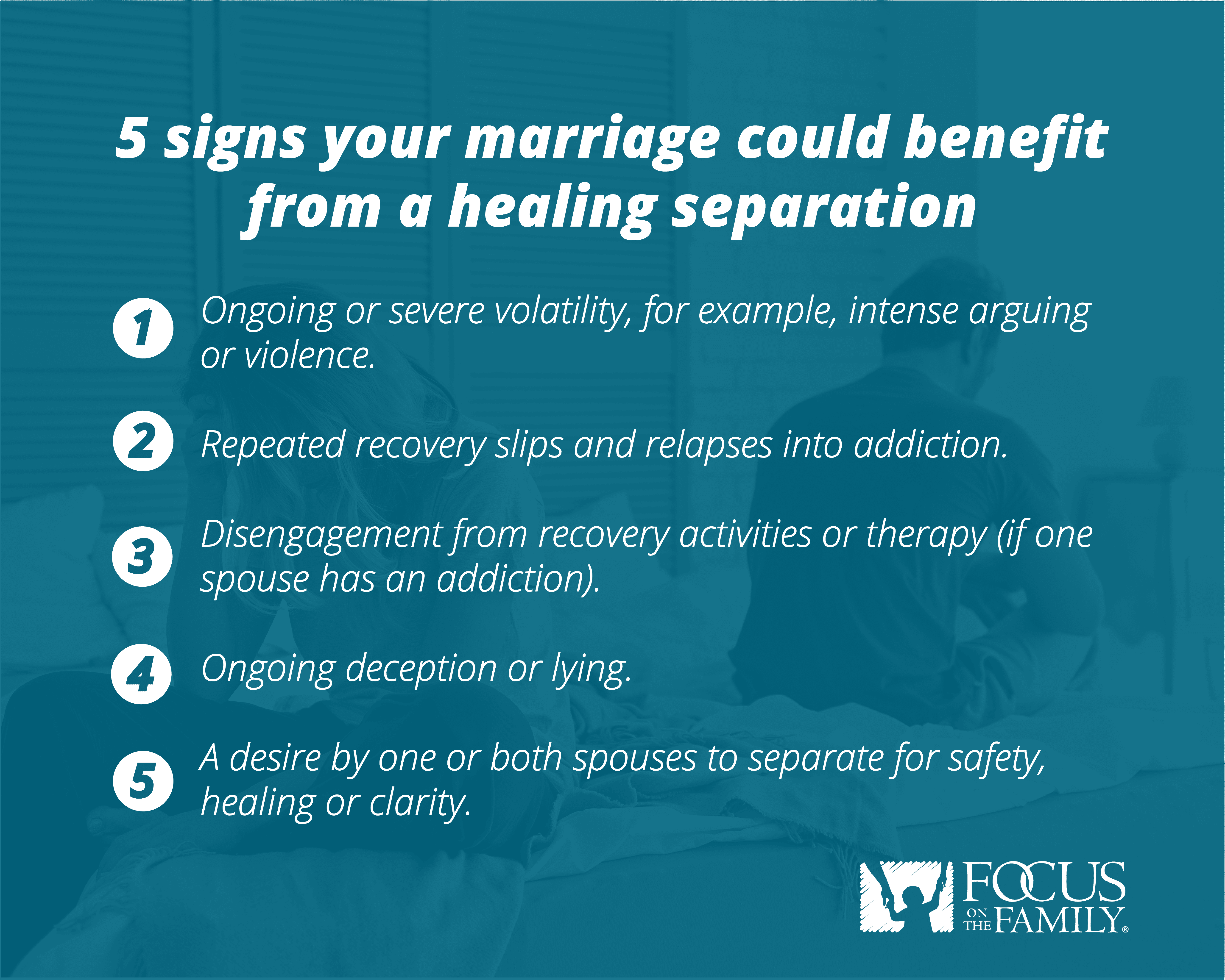Focus on the Family is dedicated to bringing healing and restoration to couples who are struggling in their marriage. But God’s design for marriage never included abuse, violence or coercive control. Even emotional abuse can bruise or severely harm a person’s heart, mind and soul. If you are in an abusive relationship, go to a safe place and call the National Domestic Violence Hotline at 1-800-799-7233 or visit them online at thehotline.org.]
“I want a divorce.” Carol finally said the words to Ron. She had had enough. Ron was not going to continue to ignore her issues and dismiss her feelings. She was finally going to be free from his anger. She thought about her coworker David and how he listened to her and comforted her when Ron didn’t see her pain. Before she knew it, she was in a full-blown affair. It was too late for her and Ron. He had plenty of time to change, and now she was ready to move on.
Ron was dumbfounded. After 35 years of marriage and three children, this was not how he expected to move into his golden years. Sure, he got angry at her sometimes, but that’s just how he let out his frustration — it wasn’t anything his dad hadn’t done. Carol was his best friend, and he was not ready to end their marriage. Nevertheless, Carol was gone. She moved in with her sister.
Ron was desperate. He searched online for a marriage counselor and asked Carol if she’d be willing to go with him. Carol said no and reinforced her need for space. Ron went to see the counselor anyway. He shared his story and expressed his desire to become a safe place for his wife. The counselor showed Ron how harmful patterns and habits in his marriage had led to the disconnect with his wife. He would have to try something new. The counselor then described a “healing separation” and how it might be the key to rebuilding his marriage. She gave him several things to read and encouraged him to share what he had learned with Carol.
At first, Carol was completely adamant that nothing could change the way she felt. But Ron was persistent. He shared the information he received from his counselor and assured Carol that he was willing to do whatever it would take to work things out. He did not pressure her to come home but continued to invite her to join him in marital counseling. Eventually she agreed to go to a counseling session. She had little hope, but at least she could tell the children she had tried.
The night before the counseling appointment, Carol was so anxious she felt she would throw up. The burden of her affair was eating at her, but she did not want to face Ron. Finally, she texted him and asked if she could stop by the house to talk. Ron agreed and soon she was seated across from him at their kitchen table. As she began to talk, everything flooded out — her pain at his rejection, her affair and her hopelessness. Ron sat in disbelief at what he was hearing. He was overwhelmed with conflicting emotions, but this conversation was different from those they’d had before. He did not rage. He cried. He asked questions. He invited her again to join him for counseling.
The next day they had their first counseling appointment together. Ron continued to struggle his way through the shock of Carol’s affair. Carol had ended her relationship with David, but she was apprehensive about continuing her marriage to Ron — his anger was still an issue. However, she was willing to see what God could do and agreed to a healing separation under the guidance of their counselor.
What is a healing separation?
A healing separation (also known as a trial or therapeutic separation) is temporary and structured time apart to help a couple heal their broken relationship. During this time, the couple works toward individual healing and growth. They also evaluate and change dysfunctional patterns and behaviors in their marriage. The structure creates rules and boundaries that provide an opportunity to build a relationship that works for both spouses and prevents dissolution of the marriage.
Note that a healing separation is an informal agreement between the two spouses and is not a legal separation. A legal separation involves lawyers and judges. A lawyer can help couples outline rules and expectations around financial issues, child custody and support, division of assets and debts, and spousal support. Thus, a legal separation occurs when a judge formally declares that a husband and wife are separated. It is often the first step to a divorce.
The goal of a healing separation is to provide space to evaluate and repair the broken parts of the marriage, resulting in two healthy people and a restored marriage that both spouses love.
Establishing a healing separation
A healing separation includes many detailed aspects, but two basic steps are essential: defining the goal of the separation and outlining the rules of engagement surrounding the separation.
1. Clarify the purpose of your healing separation
Often, a couple considers separation because they’re experiencing feelings of hopelessness around their relationship. One or both spouses are consistently sad or unhappy, or the couple is stuck in a cycle of conflict. They feel the marriage cannot be saved, and many times, one or both spouses are unwilling to put in the effort to restore the relationship. They see the only resolution as separation.
A healing separation provides hope and purpose to the scenario above. The goal of a healing separation is to provide space to evaluate and repair the broken parts of the marriage, resulting in two healthy people and a restored marriage that both spouses love. This differs from a separation in which one spouse simply moves out of the house.
A healing separation can help you and your spouse:
- Gain perspective.
- Take the pressure off a hurting or broken relationship.
- Reboot your marital system.
- Deal with a volatile or unsafe home environment because of poorly managed conflict or anger.
- Address past physical or emotional abuse.
- Deal with addictions (drugs, gambling, alcohol, porn, sex).
- Recover from emotional or physical infidelity.

2. Establish guidelines to your healing separation
The best approach is for you and your spouse to agree on guidelines, rules and goals of your healing separation and to put them in writing. Below are some factors to consider.
Time frame
Consider when you will begin the separation and when it will end. I typically recommend a six month limit because the likelihood of restoration drops after that. Guard against turning this time of healing and relationship restoration into a long-term separation.
You cannot coerce an individual into reconciliation. Each spouse has the right to determine their terms for separation and reconciliation. Vicki Palmer, an expert on surviving infidelity, advises:
Since separation is a physical boundary, it is a non-negotiable personal boundary. That means if one person wants to be separated, they have a right to be separated — just as they have a right to say no to physical (or sexual) touch. One person may decide unilaterally that they want a separation. An agreement from the other person is not needed. However, both members of the couple must be in agreement for a separation to end.
Legal advice
Be upfront with each other if one of you is currently or intending to seek legal advice. If so, you may want to consider a legal separation.
Extra-marital relationships
Completely remove any relationship that has included or might lead to emotional or physical infidelity. You cannot rebuild your marriage if you are pursuing or dating another person.
Professional counseling
Involve a licensed Christian counselor as part of your reconciliation strategy. You and your spouse both bring your issues that are creating relational dysfunction into the marriage. You both need to deal with these issues through individual counseling and other personal growth experiences. Couples therapy is also necessary to deal with your relationship issues. Both types of therapy are critical for the success of the healing separation.
Sexual intimacy
Discuss appropriate boundaries around physical intimacy, i.e., holding hands, hugging, kissing and sex. Some couples feel safe enough for sexual intimacy while others need a clear boundary of no physical contact.
Communication rules
Determine the method and frequency of your communication. Consider boundaries around texts, emails, phone calls and face-to-face interactions.
Enjoyable time together
Decide how you will spend enjoyable time together. A big part of rebuilding a relationship is engaging in enjoyable activities. Talk about how you will date as a couple, attend church and spend time as a family.
Living arrangements
Agree on whether you will have an in-house separation, i.e., sleeping in different rooms, or if one of you will move out. Most people need more emotional and physical space, so discuss who will move out and where he or she will live.
Children
Agree on how you will parent while you are separated. How will you manage daily activities, school, visits, holidays and vacations? How and when will you tell your children about the separation? The goal is to mitigate the emotional trauma for your children.
Finances
Decide together if you will maintain joint bank accounts and plan for how you will manage other important financial issues, such as the accumulation of debt (credit cards) and savings.
There Is Still Hope for Your Marriage
Will a healing separation work?
Whether a healing separation will work depends on how committed both parties are to reconciliation. Rebuilding a broken relationship is difficult. One study found that 87% of couples end up filing for divorce after separation. In another study, researchers found that about 80% of couples who separated “ultimately divorced, most within three years.”
Terry Gaspard, licensed therapist and writer at The Gottman Institute, refers to a separation as “a double-edged sword.” A separation may give a couple time to heal and work on their relationship or “… time apart can cause you to further detach from your partner and be disappointed when you reunite and find that the same patterns of annoying behaviors exist. This is especially true if one or both of you don’t take responsibility for your part in the breakdown of the relationship or is unwilling to attend therapy sessions.” A healing separation can work, but it takes time and significant effort.
As Christians, we are encouraged because we know that God is in favor of marriage. The God who determined that “two shall become one” is the same God who can keep the two united — if they both surrender their broken marriage to Him. He is able to not only restore a marriage but to make it better and stronger than before
With prayer and perseverance from both spouses — if both spouses are determined to do the work required individually and corporately to restore and rebuild their marriage — a healing separation can be effective.
How will you know when it’s time to reunite?
For a healing separation to have the desired effects in your marriage, you and your spouse should develop clear goals that must be met for the separation to end. For example, you may require that your spouse attend a certain number of therapy sessions or achieve a certain amount of time without viewing pornography.
In addition, couples should also have clear expectations for how their relationship is to continue when they resume living together. Palmer points out, “One of the biggest mistakes couples make when ending a period of separation is having no agreements about what will happen going forward. It is not uncommon for an addict to return to the family home and within three months to have significantly reduced his engagement in recovery activities — or worse — abandoned them altogether.” Palmer recommends that the couple make a post-reintegration plan that accounts for at least one year. For example, one spouse may require the other to continue seeking therapy or working with their sponsor after the separation has ended.
The goal of a healing separation is to work toward individual healing and growth as well as to deal with dysfunctional patterns within a marriage. It would be of no benefit to resume a relationship if the issues that led to the separation have not been adequately addressed. Couples should seek advice from a licensed Christian counselor to guide them in crafting goals to end the separation and provide tools to navigate living together afterward.
Carol and Ron — the rest of the story
Carol and Ron continued attending individual therapy, as well as checking in together once per week with their marriage counselor. After several months, the counselor brought up the idea of attending a marriage intensive program. They took up the challenge and after much hard work, Carol and Ron moved back in together. Ron and Carol are now well-equipped to handle difficult situations that may come up — individually and as a unit. They love each other and report that they plan to “grow old together.”
God is in the business of reconciling relationships. He is able to turn even the most hopeless situations into something beautiful — just like He did for Ron and Carol.
If you’re thinking about getting a divorce or legal separation, give your marriage another chance and prayerfully consider a healing separation instead.




















